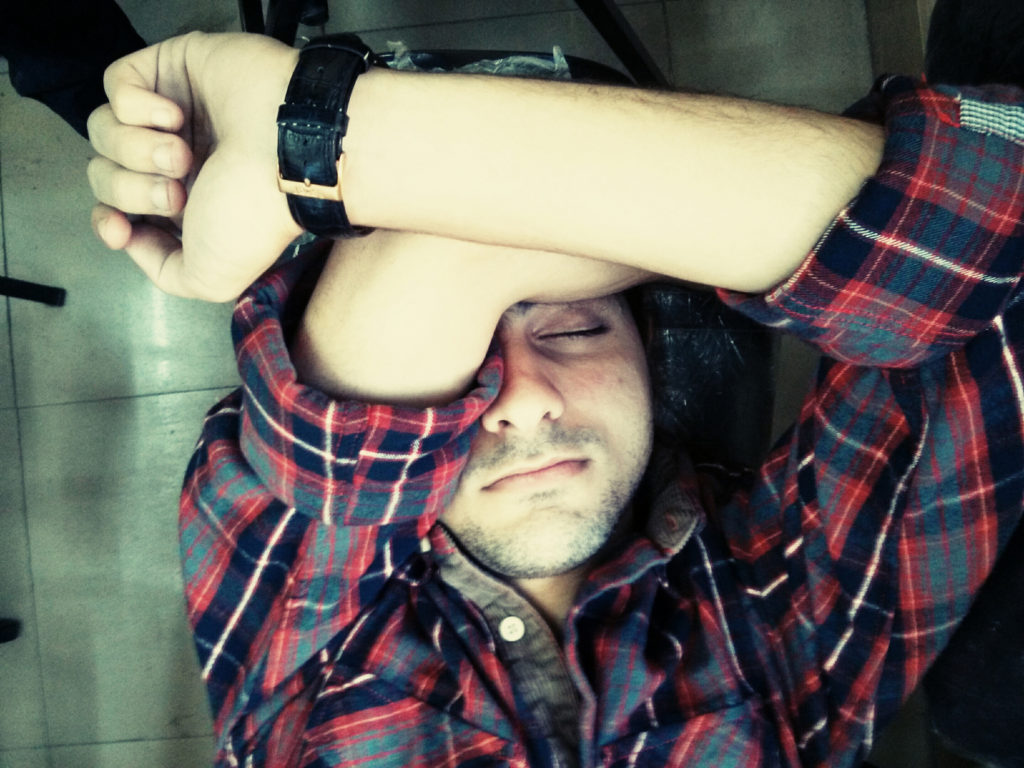The norm of deep sleep in an adult and how to correct it
During sleep in an adult, 2 main phases alternate: fast and. At the very beginning, after falling asleep, the duration of the slow phase is long, and before waking up, the duration of slow wave sleep is shortened, and the duration of REM sleep is lengthened.
A healthy adult starts sleep from the 1st tbsp. slow sleep, lasting 5-10 minutes. Next 2nd st. lasts 20 min. Then follow 3-4 tbsp., lasting another 30-45 minutes. Further, the sleeper again plunges into the 2nd tbsp. NREM sleep, followed by the 1st episode of REM sleep, which takes only 5 minutes. This is one cycle.
The initial cycle lasts about an hour and a half. During the repetition of cycles, the proportion of non-REM sleep is shortened, and the proportion of fast sleep is lengthened. During the last cycle, the duration of the fast cycle can be up to one hour. A healthy adult experiences 5 cycles during a night's sleep.

slow sleep
Non-REM sleep is also divided into certain stages:
- The first is drowsiness with dreamlike visions. At this time, solutions to daily problems can clearly appear in the brain.
- The second is the so-called sleep spindles. At this time, consciousness turns off, but a person can be easily awakened, thanks to the increased thresholds of perception.
- The third is a deeper sleep in which sleep spindles are still preserved.
- The fourth is the deepest sleep, sometimes called delta sleep. The duration of the deep sleep phase decreases from cycle to cycle.
Actually, under the concept of delta sleep, the penultimate and last stages are sometimes combined. It is almost impossible to wake a sleeping person during this period. This is exactly the stage in which it appears, or, but upon awakening, a person does not retain memories of what happened. Normally, all 4 slow-wave stages of sleep of the 1st cycle occupy up to 80% of all sleep.
From the point of view, in this phase the body heals physically - cells and tissues are restored, self-healing of internal organs occurs. During this period, the body restores its energy consumption. During REM sleep, he restores his mental and intellectual resources.
What happens during delta sleep
During delta sleep, the rhythms of the heartbeat and respiratory rate decrease, and all muscles relax. As this phase deepens, the number of movements of the sleeper becomes minimal, it becomes difficult to wake him up. If, nevertheless, the sleeping person is awakened at this time, he will not remember dreams.
During slow-wave sleep, according to the researchers of the phenomenon, restorative metabolic processes occur in the tissues, aimed at compensating for the catabolism that occurs during wakefulness.
Certain facts support this hypothesis. The delta sleep stage is lengthened in some cases:
- after active physical work;
- during a period of rapid weight loss;
- with thyrotoxicosis.
If the subjects are deprived of this phase artificially (by exposure to sound, for example), then they begin to complain of physical weakness and unpleasant muscle sensations.
Also, delta sleep plays an important role in the processes of memorization. Experiments were conducted during which the subjects were asked to memorize meaningless combinations of letters before going to bed. After three hours of sleep, they were awakened and asked to repeat what they had learned before going to bed. It turned out that the more delta waves were recorded during this period of sleep, the more accurate the memories were. The results of these experiments determined that the memory impairment that occurs with prolonged sleep disturbances and insomnia is associated precisely with deep sleep problems.
The test subjects react to the deprivation of deep sleep in the same way as to the complete deprivation of sleep: 2-3 nights with the use of arousal reduce efficiency, slow down the speed of reactions, give a feeling of fatigue.
How long should deep sleep last?
Each person has their own individual norm for how much sleep they need. There are short sleepers, medium sleepers, and long sleepers. Napoleon was a short sleeper - he slept only 4 hours. And Einstein was a long sleeper - he was at least 10 hours. And both were very effective figures. However, if an ordinary person is forced to reduce his norm, then, probably, in the morning he will be negative, immediately tired and angry.
Scientists at the University of Surrey conducted an experiment in which 110 healthy adults who had never experienced. On the first night, the participants spent 8 hours in bed and showed that: subjects aged 20-30 years old slept 7.23 hours, 40-55 years old 6.83 hours, 66-83 years old - 6.51 hours. The same trend was observed in the time of deep sleep: 118.4 minutes in the first group, 85.3 in the middle group, 84.2 minutes in the most age group.
The first thing that begins to suffer with a lack of delta sleep is the endocrine system. With a lack of deep sleep, a person does not produce growth hormone. As a result, the belly begins to grow. These people suffer: at night they experience short-term respiratory arrests, during which they can simply not breathe for up to 1.5 minutes. Then the body, out of a sense of self-preservation, gives the command to wake up and the person snores. This is a very dangerous condition during which heart attacks and strokes occur much more often. In the treatment of the syndrome, people lose weight dramatically, because they are improving the production of the hormone. Sleep apnea causes irresistible daytime sleepiness, which is extremely dangerous if a person is driving at this time.
The rate of deep sleep in adults is from 30 to 70% of the total sleep time. To increase its percentage, you must:
- create a more efficient wake/sleep schedule (you need to go to bed and get up at the same time);
- give the body physical activity a couple of hours before bedtime (more details);
- do not smoke, do not overeat, do not drink coffee, alcohol, energy drinks before bed (we made);
- sleep in a comfortable room (in a ventilated room, in the absence of extraneous sounds and light).
With the onset of old age, the duration of non-REM sleep decreases. In 80-year-olds, the long phase of sleep becomes 62% less than in twenty-year-olds. There are many factors that affect aging, but if the phase of non-REM sleep is also reduced, then the aging process goes even faster.

How to measure your sleep
It is possible to accurately separate all 5 stages of sleep only by the encephalogram of the brain, rapid eye movements and other modern studies. If you just need to equalize your sleep during the week, you can use special fitness bracelets. Fitness bracelets cannot read what phase of sleep the body is currently in, but they record the movements of a person in a dream. A fitness bracelet will help divide sleep into 2 phases - a person tosses and turns (phase 1-3), sleeps motionless (phase 3-5). Information on the bracelet is displayed in the form of a graph-fence. True, the main purpose of this function of fitness bracelets is a smart alarm clock, which should gently wake a person in the fast phase of sleep.
Discovery of the delta sleep peptide
In the 70s, during experiments on rabbits, a group of Swiss scientists discovered the delta sleep peptide, which, when exposed to the brain, is able to induce this phase. Scientists isolated it from the blood of rabbits in the deep phase of sleep. The beneficial properties of the substance are gradually being revealed to people over the course of more than 40 years of research, it:
- activates mechanisms of protection against stress;
- slows down the aging process, which is facilitated by its antioxidant properties. The life expectancy of mice during experiments with its use increased by 24%;
- has anti-cancer properties: slows down the growth of tumors and inhibits metastasis;
- inhibits the development of alcohol dependence;
- exhibits anticonvulsant properties, reduces the duration of epileptic seizures;
- is an excellent pain reliever.
How to increase delta sleep
A number of experiments have been conducted that study the effect of physical activity on delta sleep. The men worked out on an exercise bike for two hours. Daytime activities did not affect the duration of sleep in any way. Evening classes had a notable impact:
- increased by 36 minutes the total length of sleep;
- the period of falling asleep and drowsing was shortened;
- deepened delta sleep;
- the cycle lengthened from one and a half to two hours.
With the introduction of additional intellectual loads (tests in the evening, solving logical problems), changes in the deep sleep phase were also recorded:
- the proportion of the deepest stage increased due to sleep spindles;
- lengthened 2nd cycle;
- an increase in the work of activating systems was recorded.
Any stressful situations cause a shortening of the delta sleep phase. Delta sleep is a mandatory participant in all changes in human living conditions. An increase in its duration compensates for any load.
List of used literature:
- Feinberg I. Changes in sleep cycle patterns with age // J Psychiatr Res. - 1974 - Vol. 10, no. 3-4. - P. 283-306.
- Legramante J., Galante A. Sleep and hypertension: a challenge for the autonomic regulation of the cardiovascular system. // Circulation: journal. - 2005 - Vol. 112, no. 6 (9 August). - P. 786-8. - PMID 16087808.
- Morrissey M., Duntley S., Anch A., Nonneman R. Active sleep and its role in the prevention of apoptosis in the developing brain. // Med Hypotheses: journal. - 2004 - Vol. 62, no. 6. - P. 876-9.











